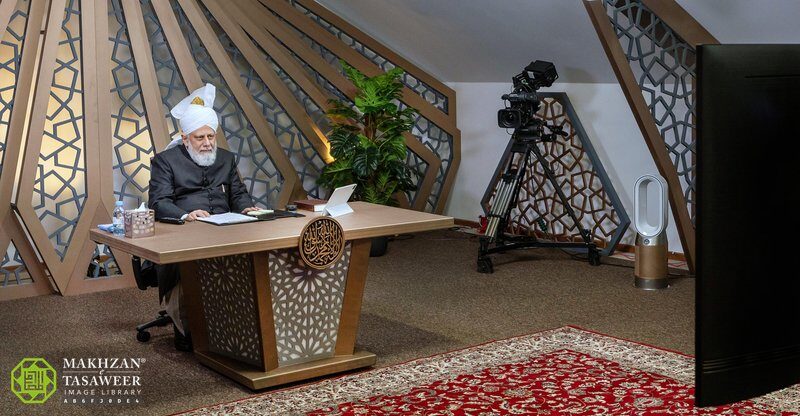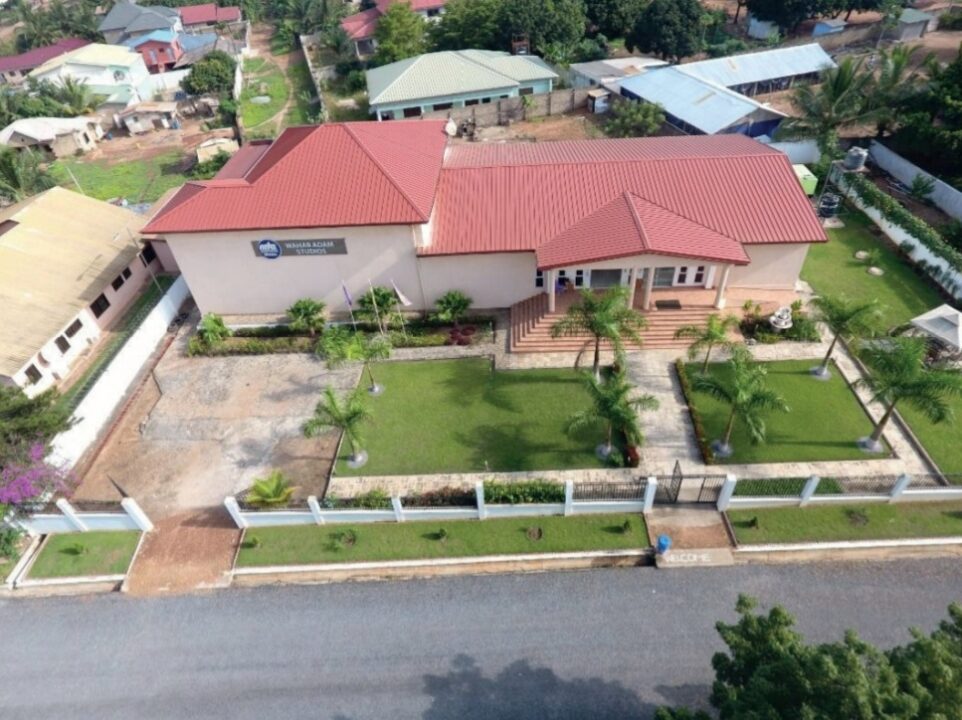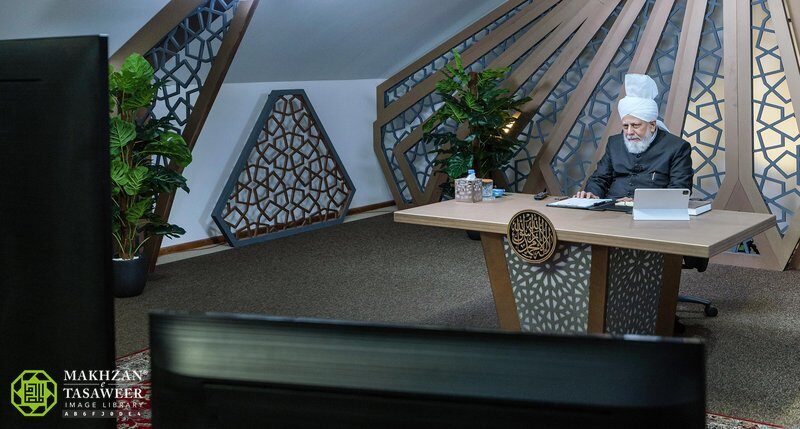
Nasirat (Ahmadi girls aged 7-15) from Lajna Imailllah Ghana met with Hazrat Khalifatul Masih V, may Allah be his Helper, through a virtual mulaqat on 27 November 2022.
The programme started with Fatiha Mubina reciting a portion from the Holy Quran and Safawa Asari presenting the translation. Sofia Mubashar and Farwa Bilal presented an Arabic qaseedah of the Promised Messiahas written in praise of the Holy Prophetsa. After they recited the qaseedah Huzooraa asked the girls where they lived in Ghana, to which they said they resided in Jamia-tul-Mubashireen. A group of students from TI Ahmadiyya School presented an Urdu poem. Before the group began, Huzooraa asked the group where they lived in Ghana, to which they replied Accra. Atiyatul Kafi then reported on the activities of Nasirat-ul-Ahmadiyya Ghana during 2021-2022. These activities included quiz competitions on Huzoor’s Friday Sermons, essay competitions, sittings with Sadr Lajna Ghana and a creative arts and crafts competition where nasirat were asked to make something that would benefit people. Pictures of the various items made by nasirat were shown to Huzooraa along with a short documentary highlighting the works of Nasirat-ul-Ahmadiyya Ghana.
The nasirat were then given the opportunity to ask questions to Hazrat Khalifatul Masihaa.
The first questioner asked what the best purdah was for a nasirah in Ghana. In response, Huzooraa said:
“You should wear modest dress and the way you are covering your face now, your head with your headscarf, and your chin and the covering of your cheeks and the loose dress – this is the best way of purdah for you.
“This is how you will show your example to others; other Ahmadi Ghanaians and non-Ahmadi Ghanaians as well. They will ask you, ‘Who are you? You are very modestly dressed, your dress is very good, you look very pious and morally good. […] and when they come to you, you can preach to them. This is how you will become a good Ghanaian girl and woman.”
The nasirah asked Huzooraa what his favourite Ghanaian dish was when he lived in Ghana and whether he learned to cook those dishes. Huzooraa smiled and said:
“I liked so many dishes. Jollof rice – you just showed the picture of Jollof rice – it was also a favourite and I also liked Fufu with Okra soup. This is what I used to like.” With regards to cooking Ghanaian dishes, Huzooraa said:
“I did not learn to cook any [Ghanaian] dish, but I know how to cook.”
The next nasirah asked Huzooraa how children could develop a good relationship with their parents. Huzooraa said:
“Your parents always want good for you, they don’t want anything bad for you. Whenever they give you any advice or ask you to do something, that is for your good. So, you obey them. If they ask you that you go to school and study hard and get good marks, that is for your betterment, for your good. If they asked you, when you come back home, that you complete your homework first, then it is for your good. If they ask you to keep yourself clean, it will benefit you because this is how you can have good health. If they ask you to offer your five daily prayers, it is for the betterment of your spiritual level so that you will get closer to Allah the Almighty in this way.
“Always think that your parents are the people who are the best people in the world who love you, who care for you and who desire good for you. So, always obey them. And this is how you can have good relations with your parents.
“I don’t think there is any parent who does something opposite to this.”

Huzooraa was asked by a nasirah if he was supporting any football team in the FIFA World Cup 2022 and who he thought deserved to win. With a smile, Huzooraa said:
“I’m not watching football, so I don’t know who deserves to win. But when Ghana was playing [its first game], I wished that Ghana should win, but unfortunately, Ghana lost the match. So, if they are going to play some more matches then I wish they become the winner, insha-Allah.”
Adeela Ahmad said there were many names used in reference to Surah al-Fatihah – for example, Umm-ul-Kitab and ash-Shifa. She asked what the reason was. Huzooraa explained:
“Because this is the surah which contains the gist and the summary of the whole of the Holy Quran. This is why it has different names and this is the basic surah that asks you to praise Allah the Almighty and to seek His refuge. It also has so many other attributes of Allah the Almighty which it contains. Ash-Shifa – The Healer: […] It gives shifa (healing) to your spiritual diseases. […] It is the surah which contains all the subject matters which are given in detail in the other part of the Holy Quran.”
The next question was whether Allah would forgive a person who intended to seek forgiveness and mend their ways but suddenly died. Hazrat Khalifatul Masihaa said:
“Yes. If your intention is good and you have decided that you will seek Allah’s forgiveness […] If you are seeking Allah’s mercy, asking for His forgiveness, then even if you die, Allah is All-Merciful, He forgives.”
Huzooraa referred to a hadith that described a man who had murdered a lot of people and desired Allah’s forgiveness. When the man was on his journey to visit a person in a far-off land who would tell him how to seek forgiveness, he died. The angels of hell and heaven began arguing over who would take the man’s soul. Ultimately, it was shown that the man was closer to the land he was trying to reach than to where he came from and therefore he was admitted to heaven.
Huzooraa concluded by saying:
“If at the end you are asking for forgiveness after committing sins or doing something wrong, Allah the Almighty forgives you. Allah is All-Merciful, Ever-Gracious.”
Another nasirah asked what Islam said about make-up and other beauty products for women. Huzooraa said:
“Islam says that you can wear makeup, no problem. But always remember that there are some other duties of a Muslim. You have to offer your daily prayers. When the time for prayer comes, you should not bother that you are wearing make-up so you will not perform wuzu or ablution. You do ablution and offer your prayers – you should not bother about your make-up then.
“If you are only caring for your make-up and leave your prayers and do not fulfil all the requirements which are needed in the prayer then you are committing a sin, you are doing wrong. Otherwise, there is no harm in doing makeup.”
With regards to women using nail polish and performing wuzu, Huzooraa said there was no space between the nail and the nail polish, so a lady could perform wuzu while wearing nail polish and then offer their salat. Huzooraa said hair braids and wigs were also allowed.
Overall, “Islam permits all these things but with the condition that they should not stop you or hinder you from offering your daily prayers or worshipping Allah the Almighty”, Huzooraa said.
Kashifa Mahmud (aged nine) asked what the best way was for her to build a strong relationship with Allah. Hazrat Amirul Momineenaa said:
“Allah the Almighty says that from seven to ten you should try to observe your daily prayers – offer your daily prayers – so the first thing is if you want a good bond with Allah, you should offer your daily prayers and also read the Holy Quran. And if possible, you should try to learn the meaning of the Holy Quran or at least the meaning of some surahs of the Holy Quran which you recite in your prayers. In this way, you will strengthen your bond with Allah, your relationship with Allah and if you keep on doing it, as you grow up, you will get better knowledge and a better relationship with Allah.
Asifa Maryam Ahmad asked Hazrat Khalifatul Masihaa for the interpretation of a dream that she saw where the Promised Messiahas was in white clothes and in the sajdah (prostration) position. Huzooraa said:
“It is a good dream if you have seen that one. It means the Promised Messiahas was praying to Allah the Almighty and he showed that if you wish to get closer to Allah, you should also be in the sajdah position and while offering your prayer, you pray fervently, strongly and bow before Allah. […] And whenever you need anything, you always ask Allah.

“The best position for getting a close relationship with Allah is sajdah [prostration] – the height of humility. When you do sajdah that means you are completely submitted to Allah. So the Promised Messiahas has shown you that you should also pray in this way.”
Khadija Abu Bakr asked Huzooraa if he would visit the Volta region when he visited Ghana next. Huzooraa lovingly smiled and asked Khadija if she was from the Volta region, to which she replied in the affirmative. Huzooraa said that as of yet, he did not know if his next visit to Ghana would include the Volta region as well.
Maryam Wahab asked what subjects and professions nasirat in Ghana should study and pursue. Huzooraa recommended:
“Whichever subject you like, you can study. You can be a doctor, you can be a teacher, you can study law, you can study some other subjects. So, whichever you wish, you can study and they are all beneficial for you. Always see that you should study those subjects which are beneficial for your country fellows, your nation and your Jamaat. [As long as] you can help your nation and if you can help the Jamaat after studying, then all those subjects are good for you.”
The nasirah asked why there was a division in Islam after the demise of the Holy Prophet Muhammadsa. Huzooraa clarified:
“It was not immediately after the demise of the Holy Prophetsa – there was a Khilafat-e-Rashida for 30 years and during the time of Hazrat Usman that division started, the rift started between Muslims and it was because of the hypocrites of that time who did not want Islam to flourish.
“But it was also prophesied by the Holy Prophetsa that after my demise there will be a true Khilafat, that is Khilafat-e-Rashida for some years and then there will be a rift and division amongst Muslims and after that – there’s a narration of the Holy Prophetsa – there will be a rift for a longer period, almost a thousand years and after that, the Promised Messiah will come and he will again try to unite the Muslims.
“This is what we Ahmadis have been doing that we are trying to unite the Muslims and this is the prophecy of the Holy Prophetsa that after the demise of the Promised Messiahas the institution of Khilafat will start. That is what we are seeing that now there’s no Khilafat among other Muslims. There is a Khilafat among Ahmadis only and people are coming to join us day by day. Every year, hundreds of thousands of people come to join the Jamaat, so this is how we are increasing and others are decreasing.”
Huzooraa said:
“Whenever there will be some worldly desire among Muslims then there will be a division and that is what we saw.” Huzooraa said the so-called ‘khilafat’ after the Khilafat-e-Rashida was in fact kingship and it was Khilafat that was inherited, “whereas there’s no concept of inherited Khilafat in Islam.”
Huzooraa then spoke to Sadr Lajna Ghana, who asked Huzooraa for continuous prayers and guidance. Thereafter, Huzooraa conveyed his salaam and the meeting came to an end.

